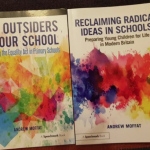Lesson Title: Shakespeare, Sonnets and Sexuality Subject: English Key Stage: 4 Date: 2020 Author: Paul Edmonson Download below KS4 English – Shakespeare’s Sonnets (you’ll need to unzip the file once downloaded by right clicking and selecting ‘extract all’)

English: Polari
This is a lesson about the ‘anti-language’ Polari. Polari is a slang used by gay men (predominantly) in the years before the partial decriminalisation of homosexuality in 1967. This lesson usualises and actualises gay and bisexual men. Learning Objectives: LO1 Understanding and responding to what speakers say in formal and informal contexts LO2 Recognise different […]

Poetry & Music lyrics analysis
Lesson Title: Poetry/Music lyrics analysis Key Stage: 4 National Curriculum Key Stage and Targets: (2.2b) Understand how meaning is constructed within sentences and across texts as a whole. (2.2g) Relate texts to their social and historical contexts and to the literary traditions of which they are a part. Cross-Curricular Elements: History – timeline of events […]

Persuasive – Argumentative devices
Lesson Title: Persuasive/Argumentative devices Key Stage: 3 National Curriculum Key Stage and Targets: (2.2 j, l+m) How texts are crafted to shape meaning and produce particular effects. How writers’ uses of language and rhetorical, grammatical and literary features influence the reader. How writers present ideas and issues to have an impact […]

CREATING EMPATHY THROUGH RHETORICAL QUESTIONS (by studying the poem ‘Quiet Kid’) – 2 Lessons
Lesson Title: CREATING EMPATHY THROUGH RHETORICAL QUESTIONS (by studying the poem ‘Quiet Kid’) National Curriculum Key Stage: KS4 National Curriculum Targets: 2.1 h. Listen with sensitivity, judging when intervention is appropriate. 2.1 j. Work purposefully in groups, negotiating and building on the contributions of others to complete tasks or reach consensus. 2.2 c. Recognise […]
Recent Videos
Recent Posts
- KS4 English – Shakespeare, Sonnets and Sexuality
 NO OUTSIDERS IN OUR SCHOOLS Teaching the Equality Act in Primary Schools & RECLAIMING RADICAL IDEAS IN SCHOOLS Preparing Young Children for Life in Modern Britain By Andrew Moffat
NO OUTSIDERS IN OUR SCHOOLS Teaching the Equality Act in Primary Schools & RECLAIMING RADICAL IDEAS IN SCHOOLS Preparing Young Children for Life in Modern Britain By Andrew Moffat PSHE – Alphabet Soup
PSHE – Alphabet Soup KS3 – PSHE – Shark Bait
KS3 – PSHE – Shark Bait KS4 – PSHE Omar: Young, Gifted and Gay 2 Part 1
KS4 – PSHE Omar: Young, Gifted and Gay 2 Part 1
Tags
SUBMIT YOUR OWN
COPYRIGHT STATEMENT
If copyright is claimed in any photograph which appears on this website, please contact us and we will happily remove it.
Subscribe / Connect
Subscribe to our e-mail newsletter to receive updates.


